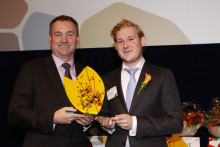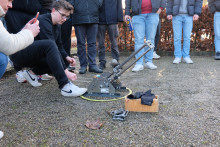To be precise, Timmer’s winning research in the field of Mechanical Engineering was titled ‘Characterization and reduction of flow separation in jet pumps for laminar oscillatory flows’. This work, which was part of Michael Timmer’s Master’s thesis, was also published in the Journal of the Acoustical Society of America.
Sustainable development
The annual Unilever Research Prize, which celebrates its 60th anniversary this year, is presented to outstanding students from Dutch universities for their work in the fields of chemistry, biology, mechanical engineering and social sciences. Although the award is more than half a century old, this year’s edition was slightly different.
Aiming to focus on sustainable development, Unilever added an additional criterion for their Research Prize this year: newly, universities were asked to nominate their best students whose work is closely related to the topic of sustainability.
Using waste heat to make electricity
Michael Timmer’s research fulfils these criteria, as the underlying theme of his research is the utilization of waste heat, a technology which is very important for an energy efficient and sustainable society. Specifically, Timmer was awarded for his work on the Thermo-acoustic Stirling Engine, which is able to convert low quality heat into electricity. By applying a Jet Pump to this engine, Timmer has been able to reduce streaming losses in such an engine.
‘We are able to utilize waste heat to, for example, make electricity at low cost and with relatively high efficiency, which is something other technologies might not be able to do,’ explains Timmer, who has also obtained the NWO research grantand is now a PhD candidate at the department of Thermal Engineering at the University of Twente, where he continues his research on efficient thermo-acoustic engines.







